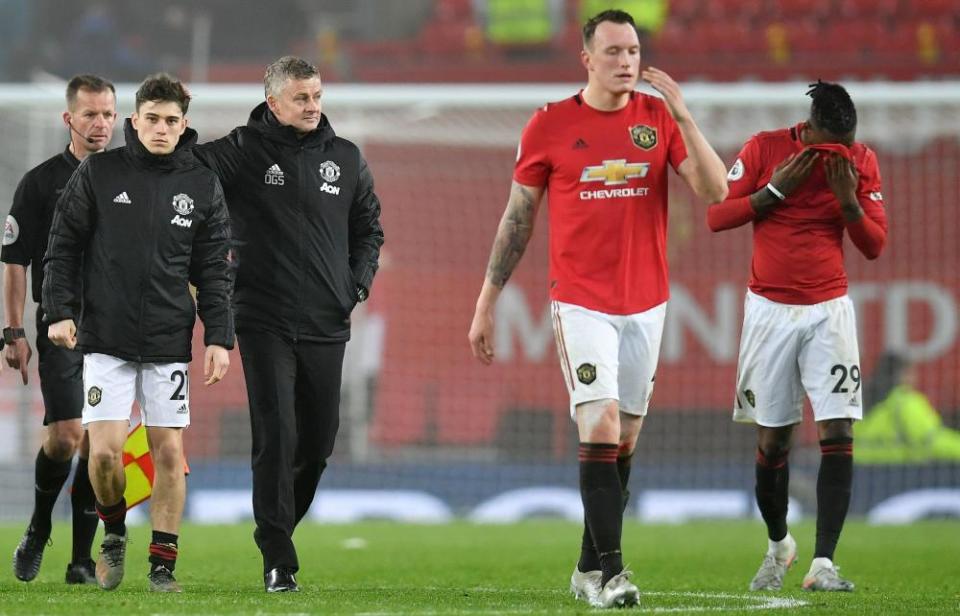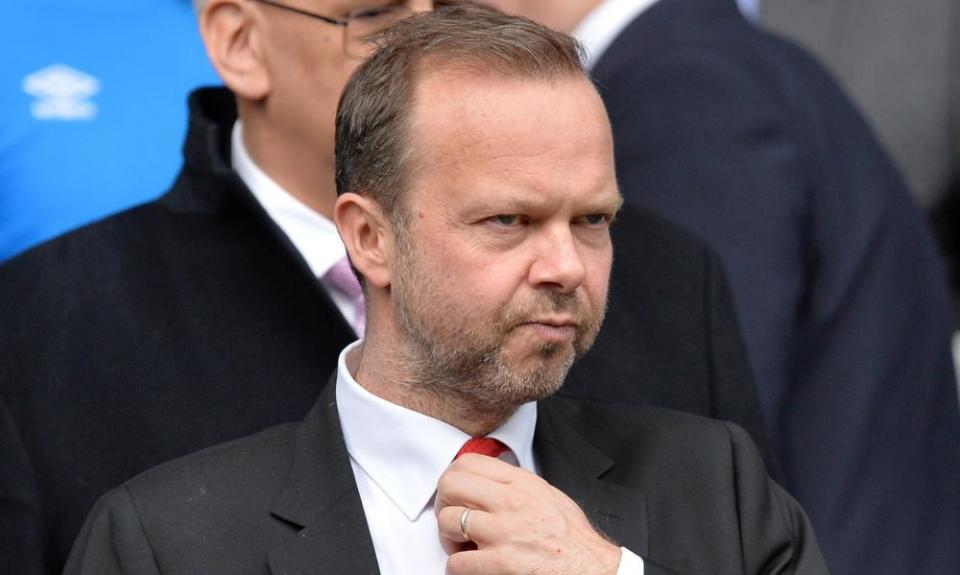Manchester United fans have a right to be angry but attacking Woodward’s home was outrageous

Remember the good old days, when Manchester United supporters used to be characterised by their uncomplaining politeness and fondness for prawn sandwiches? There were clear signs that attitudes had hardened last week, when many fans left Old Trafford early and others used the Burnley defeat as an opportunity to hope dire fates might befall the unpopular Glazer family and their representative in the north-west of England, though it is still a shocking progression to go from chanting nasty things about Ed Woodward inside a football ground to finding out where he lives and attacking his home.
The club have quite properly responded to the attempt to put the frighteners on United’s executive vice-chairman with a pledge to ban anyone found responsible for life. One would expect nothing less, yet it is entirely possible that those who turned up at Woodward’s home with flares and fireworks are not regular attendees at Old Trafford anyway. Far from being representative of the prawn sandwich brigade they are more likely to be people disenfranchised by either the price of season tickets or the difficulty of gaining admission to mainstream games nowadays.
Related: Transfer latest: Fernandes heads for United medical, Bergwijn joins Spurs
The level of dissatisfaction around Manchester United at the moment runs a lot deeper than a few poor results or Ole Gunnar Solskjær’s stewardship of the first team, and while personal attacks on board members are clearly beyond the pale it is possible to view direct action as a reply to the executive inaction that has plagued the club for years.
No one wanted the Glazer takeover in the first place, no one wanted a thriving club to be saddled with enormous levels of debt as a result, no one wanted an accountant to be placed in charge of football matters and most of all no one wanted the sort of smothering indifference to the club’s fortunes that emanates almost palpably from the complacent American owners.
Overseas investment in English football clubs is now a fact of life, though compared with, say, Manchester City or Liverpool, where inspired executive decision-making and a great deal of money have breathed new life into the operations, United have been unlucky with their owners.

The club fails a little more every year and nothing is ever done about it. The process of decay would probably have started a lot sooner, would certainly have been noticed a lot sooner, had not Sir Alex Ferguson still been in charge when the Glazers bought in. The drift since the club’s most successful manager departed has been unmistakeable, the direction offered by Woodward has been consistently disappointing, and though United supporters can see the club is being poorly run there is nothing they can do about it except make their feelings known in one way or another and prepare to be ignored all over again.
Solskjær said last week that he understands the fans’ frustration, adding that it goes with the territory at a club the size of United if results are not up to scratch. That is partly true, though the present situation, with Liverpool and City miles in the distance, the Glazers apparently happy with mediocrity and Woodward scared to make another managerial U-turn for fear of making his own position look ridiculous, is not something anyone has encountered in the past.
The club have seen irresponsible attacks on directors’ property before – Maurice Watkins’ home came under attack in 2004 when it was revealed he had sold shares to the Glazers – though few would have imagined the same fight would be going on 16 years later. Using that term rather glamourises the actions of those responsible for the latest outrage, making them sound like freedom fighters or outlaws with tacit approval when they are no such thing.

Manchester United is only a football club, and there is never any excuse for endangering anyone’s personal safety, which is what the BBC radio commentator Ian Dennis said last week when he was affronted by the macabre nature of the anti-Woodward chanting at the Burnley game. Anyone who felt the BBC was being a little prissy on that occasion, on the grounds that people who have paid to get in were simply making their dissatisfaction known in the only way open to them, will now be able to see that one thing leads to another and on the whole it is probably not a great idea for fans to go around chanting death threats to their enemies like extras in a Hammer horror production. The long and sorry history of football violence usually starts with the feeling of solidarity and protection that being in a like-minded crowd offers and ends with someone taking things a little too far.
Football supporters have long had a tendency for taking things too far, leading to behaviour bordering on the obsessive, and this sad tale is no different really. Except that football supporters occasionally have a genuine grievance too. United fans were never going to sing “Sack the board” last week, as Dennis suggested, because that time has passed and no one would be listening anyway. The club is stuck in a rut. On these pages last week Jonathan Liew poetically likened the warring factions of the dysfunctional United family to the captured crew of a gently listing prison hulk, hands tethered, fates entwined, drifting harmlessly into the high seas. Perhaps the word harmlessly needs revision barely seven days later, but the club is certainly drifting and its supporters seem to be the only ones concerned enough to complain.


